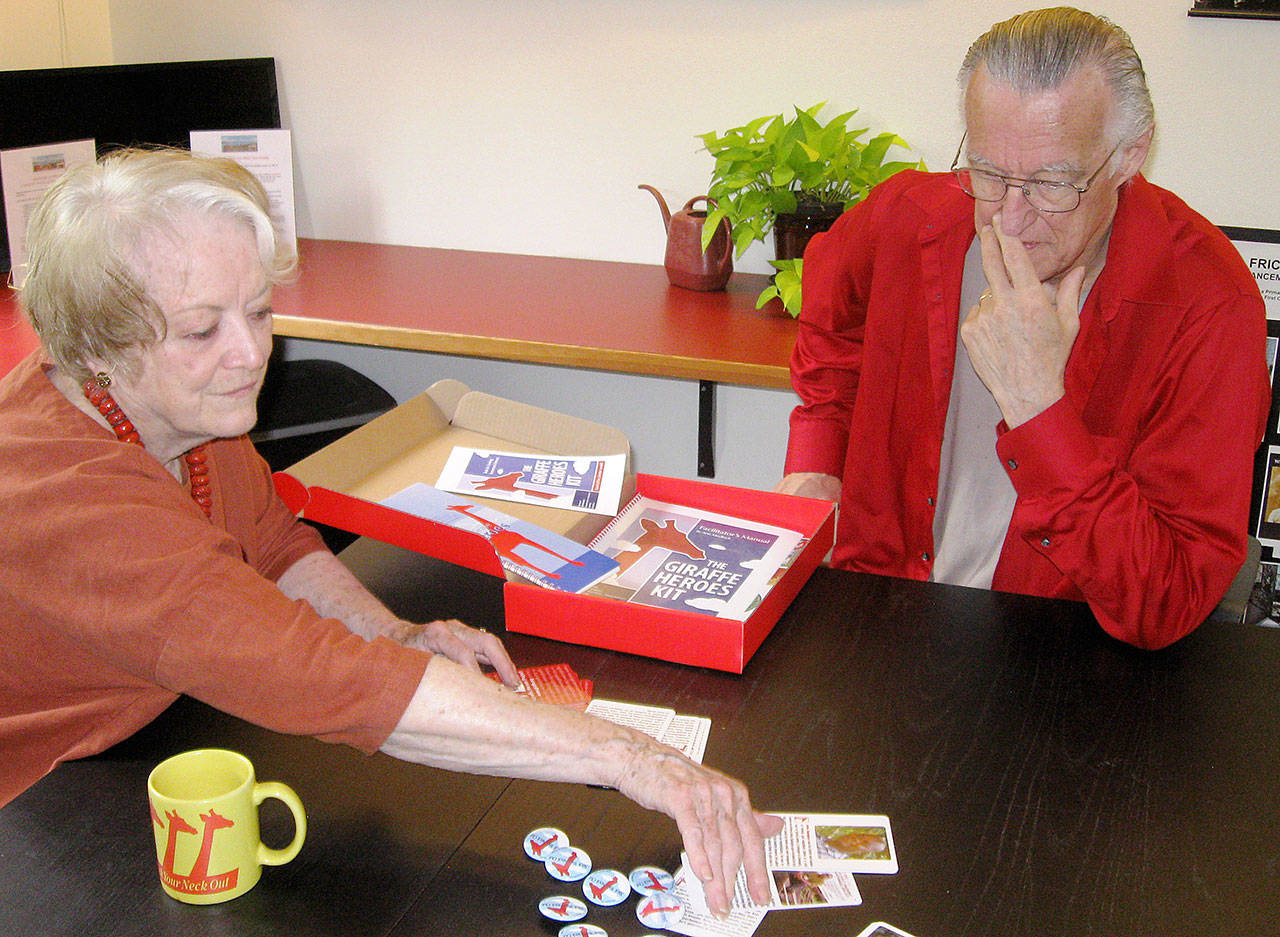There aren’t any live giraffes in Langley, but the blue Giraffe Building on Second Street houses the headquarters of a worldwide organization dedicated to supporting and honoring heroic individuals who act for the common good.
“The long neck of a giraffe is an appropriate metaphor for Giraffe Heroes who stick their necks out to make the world a better place,” said founder Ann Medlock. “Everybody loves giraffes.”
Giraffe Heroes now has affiliates in 10 locations around the world, ranging from Zimbabwe and Singapore to Nepal and Argentina. The most recently established affiliate operates in Europe from a base in Basel, Switzerland.
Medlock set up the organization almost single-handedly in New York in 1984 and was joined soon after by John Graham. Telling the stories of Giraffe Heroes, according to Medlock, was inspired by author Joseph Campbell’s philosophy of unknown or unrecognized heroism. Campbell also inspired George Lucas on the “Star Wars” story structure.
Campbell’s idea is that a “Holy Fool” represents a threat to established oppressive power. The philosophy holds that the heroic behavior is without fear and driven solely by the intention of doing what needs to be done.
“Giraffe Heroes honor people who do the right thing, regardless of obstacles,” said Medlock. “Our heroes need encouragement. Now, perhaps more than ever, we’re on a dangerous course of people thinking they can’t do anything.”
There are hundreds of stories of Giraffe Heroes in the organization’s online archives. Some show that, even in the U.S., heroic actions can be risky.
Medlock pointed out Bunnatine Greenhouse. As a Pentagon procurement manager, Greenhouse challenged dubiously high payments to one contractor for military operations in Bosnia and Iraq. The Army demoted Greenhouse, removed her from decision-making and consigned her to a small cubicle. She hung her Giraffe Heroes commendation in her smaller workspace.
“In Zimbabwe, there are people who are terrified, getting arrested and disappearing. Giraffe Heroes Zimbabwe gives them hope, publicity and tools to shape their future,” said Medlock.
“In the U.S., we offer the same, especially to a lot of what we call ‘broken-hearted patriots’ who see government is not operating the way it should and who try to make improvement. Our elementary school curriculum helps kids worldwide build lives as courageous and compassionate citizens.”
Providing encouragement and support for local programs is an important part of the work of Giraffe Heroes, according to Medlock.
“We give people tools to help them join the action,” she said. “John literally wrote the book on successful citizen involvement, and he relied on the Project’s strategies and tools as a leader of environmental activists who successfully pressed Island County to comply with the state’s Growth Management Act in the 1990s.”
Starting out, Medlock was a freelance writer. Graham was a former diplomat, with experience in conflict and battling human rights abuses. Medlock started recording heroic stories and sending them to radio stations across the country. Graham recognized that people were being inspired by the stories and that there were different paths to a compatible goal.
“Fundraising was extremely hard, and the cost of doing business in New York City was high,” said Medlock. “We discovered Whidbey, got an 800 number and a fax machine and moved our operation. We knew Whidbey would work. There’s a lot of talent on the island.”
Medlock said Giraffe Heroes got an enthusiastic and supportive welcome from businesses and individuals on Whidbey.
Attorney and former Seattle mayor Paul Schell built the retail office structure which became known as the Giraffe Building. A large wood carving of a giraffe head hangs under the second story eave. With the remodeling of Second Street in 2014, the imprints of giraffe footprints were carefully restored in the sidewalk in front of the building.
The Schell family developed the Inn at Langley and the Boatyard Inn and had a summer home on the bluff over Saratoga Passage. Schell was also active in the development of the Whidbey Island Center for the Arts.
“With the internet, it’s possible to operate from anywhere. People all over the world have adopted our template,” said Medlock. “Over time, we’ve learned that the concept of sticking your neck out has to adapt to local cultures.”
“When we had an office in Russia, for example, the adaptation came out as encouraging people to ‘stand tall’ to work for the common good. In Russian, ‘stick your neck out’ translated to ‘commit suicide.’”
Right now, Medlock is preparing the next Giraffe Heroes nominations to present to the directors later this month.
Medlock and Graham are also working on what they call a “succession plan” for getting as much of the operating material as possible on line, so the organization can sustain itself and the work will be available worldwide for decades to come.


